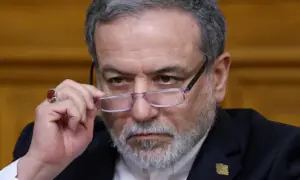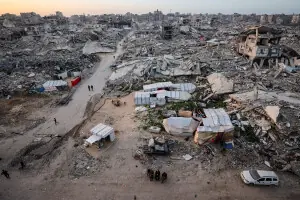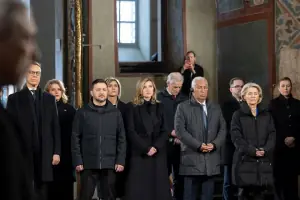EU sets conditions for Taliban ties and Kabul presence
3 min readBRDO CASTLE (KRANJ), Slovenia: EU countries on Friday laid out their conditions for stepping up engagement with the Taliban, agreeing to establish a joint Kabul civilian presence to help departures if security allows.
"We have to engage with the new government in Afghanistan, which doesn't mean recognition, it's an operational engagement," EU foreign policy chief Josep Borrell said, following a meeting of the bloc's foreign ministers in Slovenia.
"This operational engagement will increase depending on the behaviour of this government."
He laid out a raft of "benchmarks" that the new authorities would have to meet as the Taliban gears up to announce a new government after seizing power.
These included Afghanistan not serving as a base for terrorism, respecting the rights of women and the media, the establishment of an "inclusive and representative" government, and allowing access for aid.
And he said the Taliban must live up to its commitment to allow at-risk foreign nationals and Afghans to continue to leave.
"These conditions are not negotiable for us," German Foreign Minister Heiko Maas told journalists.
"Of course nobody has the illusion that all of this will be fulfilled 100% in the coming few days," he said, calling it a "long-term task".
Borrell said EU countries agreed to establish a joint presence in Kabul, if security allows, to deal with the Taliban and ensure the departure of Afghans the bloc had been unable to get out of the country.
"In order to implement this evacuation... we have decided to work in a coordinated manner," Borrell said.
He added that the bloc would "coordinate our contacts with the Taliban, including through a joint European Union presence in Kabul ... if the security conditions are met".
EU diplomats formerly based in Kabul have left Afghanistan for neighbouring countries or to return to their homelands.
**- Security guarantees -**
The bloc fears the absence of diplomats leaves the field open to countries such as Russia, China, Iran, Pakistan and Qatar, which are keeping their embassies open.
Maas insisted EU countries would need "security guarantees" before the return of diplomats.
"If we want to help the Afghans we need people in the country who can get this aid to the people in need," he said.
On humanitarian aid, Borrell said the EU would look to step up its help for the Afghan people but would judge the authorities "according to the access they provide".
That comes as the United Nations said it had restarted humanitarian flights to parts of the country, linking the Pakistani capital Islamabad with Mazar-i-Sharif in northern Afghanistan and Kandahar in the south.
The EU is also looking to bolster coordination with Afghanistan's neighbours as it looks to stave off a large-scale flow of migrants from the country to Europe.
Borrell said the bloc would look to set up a "regional political platform" with the countries around Afghanistan to help stabilise the situation.
"This political platform will consider, among other issues, the management of population flows from Afghanistan; the prevention of the spread of terrorism; the fight against organised crime, including drug trafficking and human smuggling," he said.
For the latest news, follow us on Twitter @Aaj_Urdu. We are also on Facebook, Instagram and YouTube.

























Comments are closed on this story.